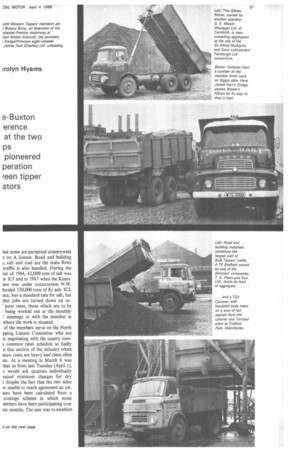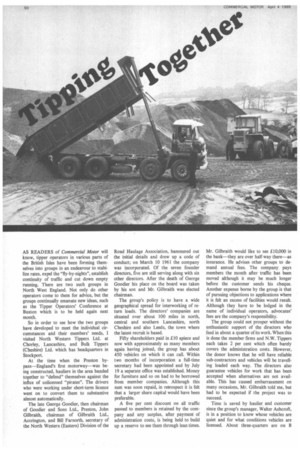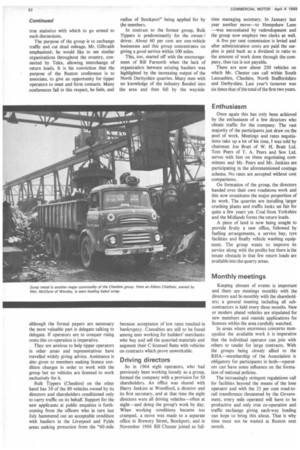iro lyn H ya ms
Page 53

Page 52

Page 54

If you've noticed an error in this article please click here to report it so we can fix it.
8-Buxton brence at the two ps pioneered peration teen tipper ators
AS READERS of Commercial Motor will know, tipper operators in various parts of the British Isles have been forming themselves into groups in an endeavour to stabilize rates, expel the "fly-by-nights", establish continuity of traffic and cut down empty running. There are two such groups in North West England_ Not only do other operators come to them for advice, but the groups continually emanate new ideas, such as the Tipper Operators' Conference at Buxton which is to be held again next month.
So in order to see how the two groups have developed to meet the individual circumstances and their members' needs, I visited North Western Tippers Ltd. at Chorley, Lancashire, and Bulk Tippers (Cheshire) Ltd. which has headquarters in Stockport.
At the tine when the Preston bypass—England's first motorway—was being constructed, hauliers in the area banded together to "defend" themselves against the influx of unlicensed "pirates". The drivers who were working under short-term licence went on to convert them to substantive almost automatically.
The late George Goodier, then chairman of Goodier and Sons Ltd., Preston, John Gilbraith, chairman of Gilbraith Ltd., Accrington, and Bill Farnorth, secretary of the North Western (Eastern) Division of the Road Haulage Association, hammered out the initial details and drew up a code of conduct; on March 10 1961 the company was incorporated. Of the seven founder directors, five are still serving along with six other directors. After the death of George Goodier his place on the board was taken by his son and Mr. Gilbraith was elected chairman.
The group's policy is to have a wide geographical spread for interworking of return loads. The directors' companies are situated over about 100 miles in north, central and southern Lancashire, north Cheshire and also Leeds, the town where the latest recruit is based, Fifty shareholders paid in £10 apiece and now with approximately as many members again having joined, the group has about 450 vehicles on which it can call. Within two months of incorporation a full-time secretary had been appointed and by July 19 a separate office was established. Money for furniture and so on had to be borrowed from member companies. Although this sum was soon repaid, in retrospect it is felt that a larger share capital would have been preferable.
A five per cent discount on all traffic passed to members is retained by the company and any surplus, after payment of administration costs, is being held to build up a reserve to see them through lean times. Mr. Gilbraith would like to see £10,000 in the bank—they are over half-way there—as insurance. He advises other groups to demand annual fees. The company, pays members the month after traffic has been moved although it may be much longer before the customer sends his cheque. Another expense borne by the group is that of pursuing objections to applications where it is felt an excess of facilities would result. Although they have to be lodged in the name of individual operators, advocates' fees are the company's responsibility.
The group could not prosper without the enthusiastic support of the directors who feed in about a quarter of its work. When this is done the member firms and N.W. Tippers each takes 2 per cent which often barely covers the administration costs. However, the donor knows that he will have reliable sub-contractors and vehicles will be travelling loaded each way. The directors also guarantee vehicles for work that has been accepted when alternatives are not available. This has caused embarrassment on many occasions, Mr. Gilbraith told me, but had to be expected if the project was to succeed.
Time is saved by haulier and customer since the group's manager, Walter Ashcroft, is in a position to know whose vehicles are quiet and for what conditions vehicles are licensed. About three-quarters are on B but some are permitted countrywide a on A licence. Road and building ;, salt and coat are the main flows traffic is also handled. During the [ter of 1966, 42,000 tons of salt was mICI and in 1967 when the Keatsass was under construction N.W. hauled 120,000 tons of fly ash. ICI, nee, has a standard rate for salt, but her jobs are turned down on acpoor rates, those which are to be being worked out at the monthly meetings or with the member in where the work is situated.
of the members serve on the North pping Liaison Committee who are it negotiating with the quarry owns common rates schedule so badly n this section of the industry where ance costs are heavy and rates often ste. At a meeting in March it was that as from last Tuesday (April 1), s would ask quarries individually eased minimum charges for dry s despite the fact that the two sides m unable to reach agreement as yet. ates have been calculated from a castings scheme in which some embers have been participating over six months. The aim was to establish true statistics with which to go armed to such discussions.
The purpose of the group is to exchange traffic and cut dead mileage, Mr. Gilbraith emphasized; he would like to see similar organizations throughout the country, connected by Telex, allowing interchange of return loads. It is his conviction that the purpose of the Buxton conference is to associate, to give an opportunity for tipper operators to meet and form contacts. Many conferences fail in this respect, he feels, and although the formal papers are necessary the most valuable part is delegate talking to delegate. If operators are to conquer rising costs this co-operation is imperative.
They are anxious to help tipper operators in other areas and representatives have travelled widely giving advice. Assistance is also given to members seeking licence condition changes in order to work with the group but no vehicles are licensed to work exclusively for it.
Bulk Tippers (Cheshire) on the other hand has 30 of the 80 vehicles owned by its directors and shareholders conditioned only to carry traffic on its behalf. Support for the new applicants at public enquiries is forthcoming from the officers who in turn last July hammered out an acceptable condition with hauliers in the Liverpool and Fylde areas seeking protection from the "60-mile radius of Stockport" being applied for by the members.
In contrast to the former group, Bulk Tippers is predominantly for the owner/ driver. About 60 per cent are one-vehicle businesses and this group concentrates on giving a good service within 100 miles.
This, too, started off with the encouragement of Bill Farnorth when the lack of organization between existing hauliers was highlighted by the increasing output of the North Derbyshire quarries. Many men with no knowledge of the industry flooded into the area and then fell by the wayside because acceptance of low rates resulted in bankruptcy. Casualties are still to be found among men working for builders' merchants who buy and sell the quarried materials and augment their C-licensed fleets with vehicles on contracts which prove unworkable.
Driving directors
So in 1964 eight operators, who had previously been working loosely as a group, formed the company with a provision for 50 shareholders. An office was shared with Harry Jenkins at Woodford, a director and its first secretary, and at that time the eight directors were all driving vehicles—often at night—and doing the group's work by day. When working conditions became too cramped, a move was made to a separate office in Brewery Street, Stockport, and in November 1966 Bill Chester joined as full
time managing secretary. In January last year another move---to Hempshaw Lane —was necessitated by redevelopment and the group now employs two clerks as well.
A five per cent commission is levied and after administration costs are paid the surplus is paid back as a dividend in ratio to the amount of work done through the company, thus tax is not payable.
There are now about 250 vehicles on which Mr. Chester can call within South Lancashire, Cheshire, North Staffordshire and Derbyshire. Last year's turnover was six times that of the total of the first two years.
Enthusiasm
Once again this has only been achieved by the enthusiasm of a few directors who obtain traffic for the company. The vast majority of the participants just draw on the pool of work. Meetings and rates negotiations take up a lot of his time, I was told by chairman Joe Bratt of W. H. Bratt Ltd. Tom Peers of T. A. Peers and Son Ltd. serves with him on these negotiating committees and Mr. Peers and Mr. Jenkins are participating in the aforementioned costings scheme. No rates are accepted without cost comparisons.
On formation of the group, the directors handed over their own roadstone work and this now constitutes the major proportion of its work. The quarries are installing larger crushing plants and traffic looks set fair for quite a few years yet. Coal from Yorkshire and the Midlands forms the return loads.
A piece of land is now being sought to provide firstly a new office, followed by fuelling arrangements, a service bay, tyre facilities and finally vehicle washing equipment. The group wants to improve its service along with the profits but there is the innate obstacle in that few return loads are available into the quarry areas.
Monthly meetings
Keeping abreast of events is important and there are meetings monthly with the directors and hi-monthly with the shareholders; a general meeting including all subcontractors is held every three months. New or modern plated vehicles are stipulated for new members and outside applications for licences within the area carefully watched.
In areas where enormous concerns monopolize the available work it is imperative that the individual operator can join with others to tender for large contracts. With the groups being closely allied to the RHA—membership of the Association is obligatory for participants in both—operators can have some influence on the formation of national policies.
The increasingly stringent regulations call for facilities beyond the means of the lone operator and with the 25 per cent road-torail transference threatened by the Government, every mile operated will have to be productive and only true co-operation and traffic exchange giving each-way loading can hope to bring this about. That is why time must not be wasted at Buxton next month.










































































































